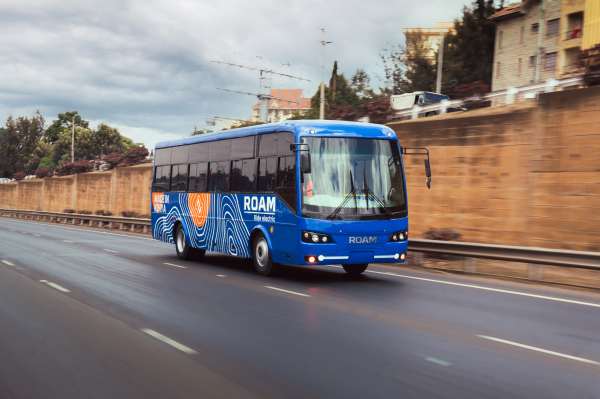Roam unveils new EV bus model to tap Kenya’s mass transit sector

Kenya-based EV startup Roam has unveiled a new shuttle bus model dubbed Move, coming as the East African country continues to push for the adoption of electric vehicles.
Roam (formerly Opibus) now plans to ramp up its production of the Move bus, and expand its charging infrastructure as it anticipates a growth in EV bus demand following Kenya’s acceleration of electric vehicle adoption, against the backdrop of skyrocketing fuel prices, and calls for a switch to sustainable transport options.
Roam said it has already has received orders for 50 buses, which it will deliver from February next year. It expects to churn out 40 units a month at full production capacity. The 42-seater buses, with a range of 200 kilometers, are assembled locally with parts sourced from China, and will cost $135,000. The bus can also be built to carry 52 people.
Roam, which designs its own buses, says it builds them in line with local requirements, including high ground clearance. “Building the body locally also enhances our design offering; we can move the door, build more boot space, accommodate preferred window fittings, or add air conditioning, and so on,” Roam’s country sales executive, Dennis Wakaba, told TechCrunch.
The launch of Roam Move comes after the company revealed plans in 2021 to launch EV buses to complement its motorcycle production business. It also follows the launch of Roam Rapid in July, which is meant to tap Kenya’s planned (now stalled) Bus Rapid Transit (BRT) system, which was intended to be powered by green (electric, hybrid and biodiesel) vehicles. Its main competitor, BasiGo, already has tens of EV buses on major routes in Kenya’s capital, Nairobi.
Founded in 2017 by Gardler, Filip Lövström and Mikael Gånge, Roam previously specialized in auto conversions, before moving to electric vehicle production.
“We started off by designing our own electric power trains back in 2018, and we have a lot of in-house expertise. We have that competence in-house that gives us more flexibility in terms of what products we can bring to the market,” said Wakaba.
Roam is backed by Silicon Valley fund At One Ventures, Factor[e] Ventures and pan-African VC firm Ambo Ventures,
The introduction of the Move bus follows Kenya’s continued push for EV adoption by zero rating the supply of electric buses and bicycles, and exempting imported and locally assembled motorcycles from excise duty, in the current finance act. The country also has special power (charging) tariffs.
Last week, the Electric Vehicle (EV) Charging and Battery Swapping Infrastructure Guidelines 2023 were published by Kenya’s energy authority to, amongst other matters, fast-track the building of public charging stations, which remains a great impediment to adoption.
As Kenya lays ground for the transition from fossil fuel vehicles, overall, electric mobility take-up in Africa is still sluggish when compared to the developed world owing to a number of challenges including weak electricity grids, insufficient charging infrastructure and hefty EV acquisition costs.
Updated to clarify that Roam will start delivering the buses from February next year.

